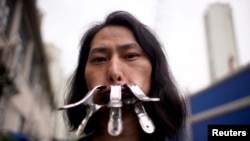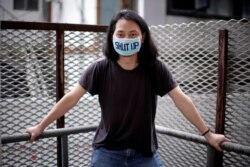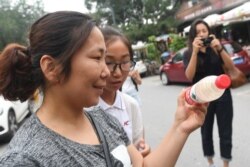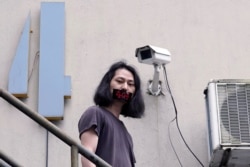“If I can’t tell the truth, I will keep my mouth shut for a month, that’s 720 hours.”
Meet Beijing-based Chinese performance artist Brother Nut. Born in Shenzhen in 1981, he’s internationally known only by his pseudonym.
From 4 p.m. June 1, until 4 p.m. July 1, he barely opened his mouth. That’s part of his project “Shut Up for 30 Days,” which is designed to spotlight China’s shrinking space for freedom of speech, particularly regarding the coronavirus pandemic.
He sealed his lips in different ways, using metal clamps, gloves and a surgical face mask inscribed with “shut up.” He also wore packing tape marked with the character’s “Error 404,” in reference to China’s Great Internet Firewall.
During a telephone interview with VOA from Beijing, he said there were a few times when he slipped up and uttered a comment. On those rare occasions, he said he slapped himself 16 times and ate only white rice for all three meals after that.
“Self-punishment, you know,” he said, “just like if the authority asks you to shut up and you fail to do so, you will be punished.”
He named himself Brother Nut 10 years ago when he began his performance arts.
“Nut, in English, it means someone who’s weird and hard to deal with,” the 39-year-old told VOA. “I think it represents my attitude perfectly.”
Living up to that name, he has done quite a few “crazy and weird” things over the past 10 years.
In 2015, he launched “Project Dust,” in which he created a brick made entirely from dust he vacuumed out of the heavily polluted Beijing city air over 100 days. The project highlighted Beijing’s air pollution problems at a time when China sought to recast itself as an environmentally aware nation.
In 2018, he made headlines with project “Nongfu Spring Market,” in which he filled 9,000 water bottles with cloudy and contaminated water from a village in Shaanxi, in northwestern China, and exhibited them in Beijing’s art district, 798 Art Zone, to showcase the country’s water problems.
In 2019, he collected 400 dolls from the children of migrant workers in Shenzhen in southeastern China, and he used an excavator to throw all the dolls into the air, advocating for the kids who lost the opportunity to get an education because of land seizures back home.
Brother Nut says that in a country like China, art is a symbol of resistance.
In the past two months, he has launched several projects regarding freedom of speech.
In addition to “Shut Up for 30 Days,” he has set up the “truth award” to salute journalists who dare to speak out during the country’s battle with COVID-19.
Brother Nut raised just short of $3,000 from 73 netizens, and he gave the award and money to Gong Jingqi, a journalist from China’s People Magazine. She wrote a bombshell feature story on whistleblower doctor Ai Fen, the director of the emergency department at Wuhan Central Hospital, one of the hospitals most directly affected by COVID-19. The original piece was quickly deleted from China’s tightly controlled social media, yet its copy was widely circulated online.
His project “Error 404” invited netizens to list sensitive words banned on China’s internet. More than 100 netizens participated, listing roughly 1,000 words as the “most sensitive words in 2020.” These included “National Security Law,” “Soviet Union has died” and “raise your hand if you disagree.”
Brother Nut said people are so used to Error 404 they feel indifferent when they see the words. “These banned phrases are the epitaph of our time,” he told VOA.
From air pollution, water pollution and migrant workers, to freedom of speech, he said he’s inching closer to the dangerous red line.
“But this red line can move, you know. Maybe instead of me moving closer to the red line, it is the red line drawing closer to everybody,” he shrugged.
He was taken away by China’s secret police for “tea drinking,” which is an unofficial way of interrogating and intimidating anyone who dares to voice different opinions. “The first thing they told me were ‘artists are garbage.’ I was pretty shocked,” he said.
Last year, he was detained for 10 days for a project he undertook on financial fraud.
After his release from prison, Brother Nut continued his performance art. “I’m on this land, so I’m focusing on the things happening here,” he said.
China’s shrinking creative space has made it hard for artists, but Brother Nut said he wants to do something to create change.
“We have to believe there’s a future for us.”








